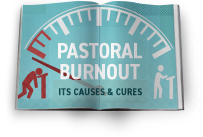“I Was Burnt Out—And I Stayed In”
“Because it doesn’t know the words.”
That was the deadpan response our deacon chairman offered when someone at our quarterly member meeting asked why the fan in the church basement was humming.
A HAPPY ARRIVAL
I arrived at my current church in July of 1992, and for a solid decade our business meetings were marked by love, unity, and good-natured, corny humor. The church wasn’t a utopia. We were sinners and as such we would sometimes hurt and offend each other. Problems arose just like they do everywhere, but we usually solved our differences quickly and went about the Lord’s business joyfully. For the first ten years I served at our church, we concentrated on growing in grace through evangelism and discipleship. The church was, and remains, a modest size, and the members for the most part peacefully enjoyed the Lord and one another.
Looking back, I regret my lack of appreciation for that peaceful season of life. Even though I’d served in ministry for many years prior to 1992, I still had a naïve and idealistic view of how temporary and fragile church unity can be. I would often hear my fellow pastors talk about the constant tension they felt in their congregations, the constant discouragement they felt in their hearts. I tried to be sympathetic, but I simply couldn’t relate.
A TIME OF WAR
“Because they didn’t know the Word” is the short answer as to how we moved from being a peace-loving people to those skilled at war. You never know how bad your roof is until it rains. And in 2002, without warning, Noahic precipitation fell relentlessly on our local assembly in the form of dissension, gossip, backbiting, false accusation, public outbursts of wrath, and a general sense of distrust.
The scalpel that exposed the cancer below the skin was unremarkable: an innocent request from a faithful member to refresh the church by-laws. They’d been written in 1933 and had been scarcely touched since. In order to read, review, and, if need be, revise them, we first needed to find them. Eventually, at the bottom of a stack of irrelevant papers, we found a copy—perhaps we found the copy. Some of the language was so antiquated that we needed Rosetta Stone to decipher its true meaning.
Nobody took the assignment seriously. Looking back, this was a critical error, for our (my) sloppiness and failure to give attention to detail is what aroused a lack of trust. Be that as it may, the cancer in the church was metastasizing and would have surfaced eventually even if we’d treated the bylaw revisions conscientiously.
When we presented some changes that reflected our church’s ecclesiology, we were accused of a conspiracy and an intentional attempt to destroy the church. Shockingly, these accusations came from those who had previously been very supportive of the leadership.
The blow was so devastating and dramatic that I, for all practical purposes, quit. I didn’t technically quit because I didn’t actually submit my resignation. I quit in that I began tenaciously pursuing a move to another church.
Previously, I had been particular about my theological convictions. These convictions dissolved as I began my quest to find a new church. I went online and found a generic “pastor search” website and mailed out a ton of resumes, paying little attention to doctrine and theology. I was burned out. It didn’t matter where I was going. I simply had to find a fast exit.
My burnout wasn’t caused by physical exhaustion. The thought of taking a sabbatical has never appealed to me. My burnout also wasn’t caused by discouragement from an unfruitful ministry. By God’s grace, we’d seen a steady stream of salvations, baptisms, and evidences of grace among the saints. Simply put, my burnout had been caused by a furious season of infighting in the church.
So I felt as though I must move on. Yet for all the bait I cast into the sea of churches, I received only one bite. A church that was committed to “purpose driven” principles asked for an interview. I looked the other way, and put my best foot forward, trying desperately to get hired. Thankfully, that church didn’t want me, and in order to feed my family I stayed put.
Meanwhile, back at the cage match, those who opposed the elders’ leadership became increasingly vocal and influential. Those people, however, weren’t as threatening as those who feigned friendship but secretly were foes. We began to categorize members—Christ’s sheep!—as “friend” or “foe” in our elders meetings. We felt as though we couldn’t trust anyone fully. The wagons were circling, and our goal was survival.
To the best of my ability, I had preached, taught, and stressed the importance of the Bible every week for ten years. I lived under the false assumption that, because I constantly called people to submit to the Bible’s claims, our church was well guarded from a collapse from within. I had assumed that, if we addressed controversies with chapter and verse, the church would experience a happy resolution.
But then we discovered that our critics didn’t know Scripture, nor did they regard it as a means for settling matters theologically. I realized how easy it is for evangelical churches like mine to embrace slogans that affirm the Bible as God’s inerrant Word only to let those slogans be trumped by pragmatism and “ways that seem right to a man.”
These discoveries emptied the bullets from our gun. If the 1933 church bylaws trumped the Holy Scriptures, then we had no Spirit-inspired rulebook and no defense.
As elders, we lovingly attempted to engage our opponents with texts of Scripture. They didn’t physically stop their ears, but they might as well have. “Don’t play Bible bingo with us,” they said. They inscribed that mantra on their shields and kept fighting.
How does a pastor survive if you take the Bible out of his hands? Allow God’s Word to be neutralized, and he’ll burn out faster than a fire-cracker.
LESSONS LEARNED
“Because I didn’t know the Word.”
That’s the baseline reason this dilemma got the best of me. I knew the Word in that I was well versed in the facts, stories, and major doctrines of the Bible. But I didn’t know the Word with respect to proper ecclesiology. The elders themselves were godly, committed men with impeccable integrity. They, too, knew the Scriptures extensively.
But we were weak in our doctrines of membership, discipline, ecclesiology, and elder-led congregationalism. As I survey the landscape of evangelical churches today, I would honestly say that our church, during our time of crisis, was comparatively solid when matched up with most. However, this is a small consolation that brought no comfort during the actual storm.
Looking back, I’m convinced that if we’d been more deliberate in our membership process, and if we’d engaged the offenders in the first steps of loving church discipline, then we perhaps could have averted some of our woes.
For ten peaceful years, our flawed ecclesiology never caused a felt pain. God was and is so merciful to our church. He’s merciful not only because he gave us a decade of serenity, and not only because he allowed our civil war to cease. He was merciful and kind in allowing that storm to rock our church.
Personally, the season of burnout and distress taught me sympathy for my fellow ministers. My sinful pride of pastoring a church where peace abounds was brought to light, and along with it came the gift of repentance. I’m no longer as quick or brash or bold to pass out advice to fellow pastors without first tenderly taking into account the fragile nature of congregations comprised of sinners. Also, as a result of our trial, we’ve tightened up our ecclesiology and become more sober and vigilant in our decisions.
Speaking for myself, the greatest benefit of that horrid trauma is that it brought me closer to the Lord himself. This episode didn’t come to an end because we, the elders, made a clever discovery or employed a strategy that turned the tide. Quite the contrary—I’d emotionally checked out. I had no gas left in my ministerial tank. “Burnout” isn’t a biblical term, but it well describes what I was experiencing.
MINISTRY IS WAR
So, what was the secret of survival?
“Because I knew the Word, the incarnate Word Jesus Christ.”
That’s the bottom-line answer as to how the season of burnout was replaced with joy and a renewed zeal to press on. I cannot give you an answer as to how our church turned the corner and returned to being a place of harmony and love.
For purposes of this article, the simple answer as to how I personally survived is Jesus Christ himself! I was like Jeremiah, fully prepared to throw in the towel: “If I say, ‘I will not mention him, or speak any more in his name,’ there is in my heart as it were a burning fire shut up in my bones, and I am weary with holding it in, and I cannot” (Jeremiah 20:9).
I wanted to quit, but the Lord wouldn’t allow it. If it was left up to me, I would have been long gone. So I don’t wish to present myself as an example of perseverance in the midst of pastoral struggles. Truth be told, I am the exact opposite.
Paul explains our pastoral calling so well in the final chapter he ever wrote. He tells Timothy to “fulfill your ministry.” A cursory reading of the two letters to Timothy shows that “ministry” often involves battles within the church. Before I was actually in the ministry, I thought it was made up of studying, preaching, teaching, evangelizing, and discipling. That’s an accurate but extremely incomplete list. Ministry also involves war.
Attacks come from the world, to be sure, but even more deadly attacks come from fellow believers. Paul’s final words express this frustration:
Do your best to come to me soon. For Demas, in love with this present world, has deserted me and gone to Thessalonica. Crescens has gone to Galatia, Titus to Dalmatia. Luke alone is with me . . . . Alexander the coppersmith did me great harm; the Lord will repay him according to his deeds. Beware of him yourself, for he strongly opposed our message. (2 Timothy 4:9–11a, 14–15)
Paul sums up his disappointment in verse 16: “At my first defense no one came to stand by me.” If Paul, perhaps the greatest Christian who ever lived, went through these trials relatively alone, then I know that my petty trials are hardly worth mentioning.
At the time, they seemed significant to me. I stayed in the ring only because “the Lord stood with me,” as Paul said to Timothy.
In part the Lord stood with me using a great deal of human support. My elders, my family, and a host of wonderful people in the church remained courageous and loyal. For their support, I remain very thankful.
But ultimately, my survival was a matter of Jesus himself being my portion, my guide, my comfort, and my rock while all of the world around me was crumbling. As I often sat alone in tears, physically trembling, unable to sleep and overcome with worry, it was in those dark hours that Christ upheld me and sustained me to press on.
This is why I stated above that God was very kind to allow this unrest to invade our church. Had it not been for the trials that led to burnout, I myself wouldn’t have experientially known the kind mercies of Christ to sustain his shepherds when their strength has failed. The subjective nature of this deliverance was granted by Christ through his Holy Spirit, and it’s anchored in the unchanging, objective truth of the gospel.
About two years after this crisis, a sermon by pastor Mike Bullmore introduced me to the glorious truths of the functional centrality of the gospel . The immovable facts that Jesus died for me and now lives as my mediator became the overarching truths that now motivate my life and ministry.
So for anyone who may be in the midst of burnout—due to exhaustion or apparent fruitlessness or conflict or some other hardship—please look to Jesus. Please cry out to Jesus. Please draw near to Jesus. Please go back to your first love and meditate on the glorious gospel and its bottomless benefits to those who have been redeemed by it. Knowing the Incarnate Word is not only the short answer—it’s the only answer for overcoming burnout in ministry.









